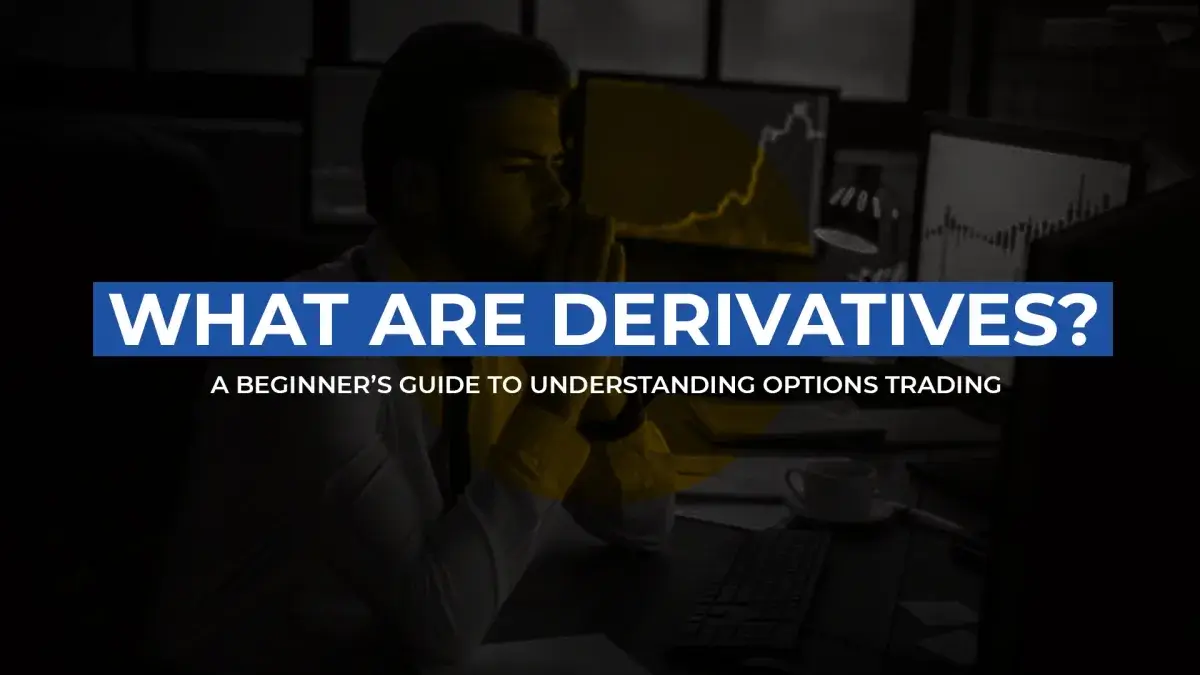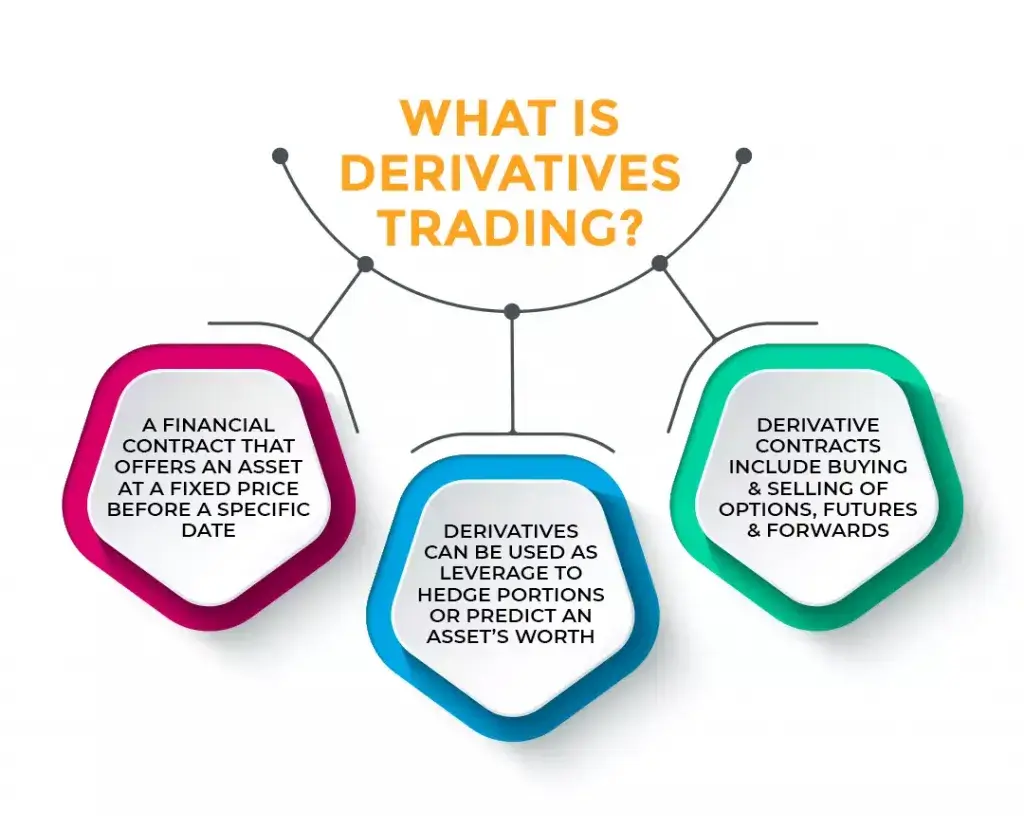What are derivatives? A beginner’s guide

Here's What We've Covered!
“Don’t lose money.” – That’s Warren Buffet’s number one rule for investing.
What’s rule number two? Don’t forget the first rule ever.
Buffet is generally regarded as the most successful investor of all time, with his billion-dollar net worth. Clearly, he hasn’t seen much loss in his lifetime of investments.
But what about regular people? How do they figure out the best ways to multiply wealth with minimal risks? It is not an easy task. This is why investment advisors occupy a prominent position in the finance industry. They know all about mutual funds, stocks and shares, bonds, equities and commodities. They are also well-versed in derivatives and options trading.
So What Are Derivatives?
First off, let’s get one thing clear. When we talk about derivatives, we are not referring to the math term that gave you a migraine in high school. No, no, no! And neither are we talking about the ghee derived from butter, even though it’s as important in finance as ghee is to our Indian food. So, let’s get straight to it:
- A derivative is a financial instrument whose value is ‘derived’ from the value of another asset, known as the underlying asset. The underlying asset can be anything – shares, commodities (like our beloved onions that can make our wallets cry too), currencies, and even interest rates.
- To put it simply, derivatives are like your mom’s special masala chai. The taste (value) of your chai (derivative) depends on the amount and quality of the tea leaves, milk, and spices (underlying assets) used.
What Are The Types Of Derivatives In India?
-
Forward contract
This is a type of derivatives contract where two parties decide to buy or sell an underlying asset at an agreed price by a fixed date. These are like futures, but without the uncle-like strictness. Here, two parties can customize the terms of their deal, like you bargaining at the local sabzi mandi.
-
Futures contract
Similar to forward contracts, futures contracts also involve two parties agreeing to buy or sell an asset. However, the parties do not meet in a futures contract. Instead, the transaction occurs through an exchange mode. Think of this as a promise to buy 1 kg of Alphonso mangoes from the local market at a set price in the future, irrespective of whether the price goes up due to a mango shortage or goes down because of a mango flood.
-
Options contract
Options contracts offer the investors the right, not the obligation or commitment to buy or sell the underlying asset. You can indulge in a ‘call option’, where you have the right to buy the asset. Whereas, the put option allows the investor to sell the underlying asset. An option is like buying a movie ticket. You have the ‘option’ to go and watch the movie or not, but you still have to pay for the ticket.
-
Swap contract
This type of contract is a private agreement between two parties and the investment professional acts as a middleman. The investors crack a deal to exchange funds or assets at a fixed formula in the future. These are like trading your tiffin with your friend because you have aloo paratha and he has paneer tikka. Here, parties exchange cash flows or other financial tools.
Read – Options Vs Futures: The Ultimate Indian Guide to Trading Instruments
Now What Is Derivatives Trading?
In the risky and unpredictable investment industry, options trading can be a game changer. They allow investors a little breathing room when buying stocks or bonds. You pay a lower price for the choice to buy assets at a specified date after analysing the stock market performance. Options, also called derivatives, are used to create a tradable contract between two or more parties.
It’s a different transaction from buying stocks. The latter requires you to pay for outright ownership of the asset. Derivatives allow you the option to buy at a later date. Investment professionals who understand the intricacies of the markets are able to master the art of options trading. They know how to hedge their bets. They can keep one ear on the ground and one eye on the stock performance to arrive at a suitable prediction. To determine whether the price will rise or fall before the due date.
Derivatives Trading Has Many Advantages!
Dabbling in derivatives has its fair share of benefits. Traders are known to use options contracts to optimise the earning potential. Here are some of the ways trading in derivatives can help investors.
-
Helps to manage risks better
It helps to know what derivative trading is and how it can help you. Derivatives are an excellent tool to protect yourself from significant losses. They serve as insurance against making bad investments. By risk hedging, investors can balance their losses in one area with the profits in another. Also, you can buy stocks in the market and place a put option on the stock with derivatives trading. If the price crashes, your put option will escalate, and your losses will be minimal.
-
It lowers your investment cost
When trading in derivatives, you don’t pay the full price of the stock until the waiting period is over. Even if the stock price rises, you get to make a profit off a lower cost. You could stand to make a very good return on investment if you understand what is derivatives trading and its many tools.
-
Derivatives have a lot of liquidity
It’s easy to buy or sell derivatives in the market as they are highly liquid. This is especially useful as stock market prices have a tendency to fluctuate very often. You could lose out on a potential gain when waiting for stocks to liquidate.
-
Can be used to increase leverage
Did you know what is derivatives trading‘s greatest benefit? They can help to magnify your returns. You can use derivatives as leverage to enable investors to indulge in more trading. They stand to make a greater profit and avail bigger investment opportunities than they can if they don’t do derivatives trading.
-
Provides for efficient portfolio management
Derivatives are preferred by portfolio managers for many reasons. They help investors manage various risk factors such as price fluctuations, foreign exchange, credit risks and interest rates. Also, they lower the cost of investment as you don’t have to pay the price of outrightly buying an asset. This helps investors diversify their portfolios and buy more options. The right combination of derivatives ensures that the profitable ones balance the losses. It also ensures the portfolio stays in a financially healthy zone.
But You Need To Be Cautious With Derivatives!
-
Risk:
Derivatives can be as unpredictable as an Indian soap opera plot. The potential for high returns comes with high risk, especially if your predictions about the market go as wrong as a samosa without aloo.
-
Complexity:
Derivatives can be as confusing as trying to understand the rules of gully cricket. It takes time and effort to understand how they work.
-
Counterparty Risk:
This is the risk that the other party in the derivative contract won’t fulfill their part of the deal, like that friend who always “forgets” to pay for his chai at the canteen.
Read – The Ultimate Guide to Options Trading Strategies: Tips and Techniques for Indian Investors
So What’s The Difference Between Derivatives & Stock Market?
| Derivatives | Stock Market | |
| Risk | Higher risk as it depends on the future value of assets. Like betting on whether it will rain samosas tomorrow. | Lower risk compared to derivatives. Like buying a plate of jalebis – you know what you’re getting. |
| Value | Derived from an underlying asset. Like the spiciness of your biryani depending on the mirch used. | Based on the company’s value. Like the price of your gulab jamun depending on the sweet shop’s reputation. |
| Size | Enormous, like a wedding buffet. | Large, but smaller than derivatives. Like a Diwali sweets box. |
| Use | Used for hedging, speculation, and gaining access to otherwise hard-to-trade assets. Like using extra green chutney for different food items. | Used for investing in companies. Like buying a sweet shop because you love their jalebis. |
Want To Learn Derivatives Trading? Proschool’s Options Trading Course Has The Answers.
Investors in India are fast realising the immense potential of derivatives trading. They are looking for advisors to guide them and help build their portfolios. You need a credible certification to enter this industry and make a mark. One of the country’s finest coaching institutions, Proschool leaves no stone unturned when providing you with the skills and tools to learn options trading.
The program has been designed to teach students the core concepts, techniques and industry knowledge that ensures you become a master options trader. The faculty contains some of the best experts in the investment field, and they can guide you on your professional journey as you learn derivatives trading.
Course highlights:
- The program is equipped to help you apply for several job profiles such as broker, risk manager and sales executive.
- The highly experienced teachers use active learning methods and offer hands-on training to students.
- The syllabus includes derivatives, option trading strategies, capital markets and types of risks.
- The course uses virtual trading applications – Sensibull to help students enhance their technical skills.
- After finishing the program, you can take the NSIM series VIII certificate.
- Your certification makes you eligible to work with NSE-listed brokerage firms.
- Proschool has an effective placement program that assists students with the job hunt and learning the proper interview etiquette.
In conclusion
More and more investment advisors have clients coming to them and asking, what is derivatives trading? You don’t want to be caught off guard and lose your clientele. A course in options trading can help you learn all the tricks and tools of the trade, ensuring you are up to par with industry standards.
Click here to learn more about our Options Trading Course
FAQs
Q1: I’m new to investing. Is derivatives trading right for me?
A: Derivatives trading can be complex and risky, so it’s not typically recommended for beginners. However, with proper education and understanding – such as through Proschool’s Options Trading Course – you can learn how to navigate derivatives trading effectively and potentially reap its benefits.
Q2: What is derivatives trading and how is it different from stock trading?
A: Derivatives trading is a type of financial transaction that involves buying or selling contracts whose value is derived from underlying assets. It differs from stock trading, which involves buying and selling ownership in a company. Derivatives trading offers a different set of advantages, including risk management, leverage, and cost-efficiency.
Q3: What are the benefits of trading in derivatives?
A: Derivatives trading can offer several benefits, including better risk management, lower investment cost, high liquidity, increased leverage, and efficient portfolio management. However, it’s important to understand that derivatives trading also involves risks and requires a solid understanding of the financial markets.
Q4: What are the risks associated with derivatives?
A: While derivatives can provide a number of benefits, they also carry significant risks. These include market risk (the risk of losses due to changes in market prices), complexity (they can be difficult to understand), and counterparty risk (the risk that the other party won’t fulfill their obligations).
Resent Post
>
Best Study Abroad Courses for Commerce Graduates
>
Emerging commerce career options in India (2026): From CA to Data Analyst
>
ACCA Opportunities You Didn’t Know About – Think Beyond Audit!
>
Which Courses After 12th Commerce With High Salary Are in Demand Worldwide?
>
How to Find ACCA Jobs Online After Qualifying: Real Portals, Tips & Career Guidance
Follow Us For All Updates!




